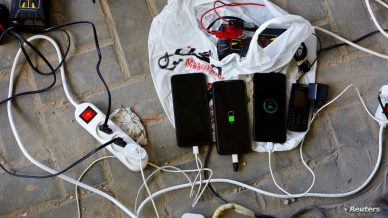Hundreds of Palestinian citizens in Deir al-Balah went in a demonstration organized by Hamas on Monday evening slamming the Palestinian Authority government in Ramallah for escaping their humanitarian responsibility toward the electricity crisis in the Gaza Strip. The protesters meanwhile expressed their appreciation to the State of Qatar for its intervention to alleviate the crisis.
Hamas leader Diab al-Jarou said that the Gaza Strip enjoys security despite the blockade and the series of crises and conspiracies plotted against it.
He added that this time the conspirators are using the electricity card since it is a human need to bring chaos back to Gaza.
He continued “Gaza is lightened by the resistance tunnels which restored dignity to our people and lightened out houses with Wafa al-Ahrar prisoner exchange deal which will be followed by a second Wafa al-Ahrar.”
Al-Jarou pointed out that the PA in Ramallah collects taxes from all the goods coming into Gaza including the fuel used to run the power station. The taxes which exceeded 50% don’t involve any benefits for the Gazan people he noted.
Hamas leader Ahmad al-Kurd told the PIC reporter that the PA in Ramallah is fully responsible for the crisis because it didn’t accept any of the drastic solutions proposed by Turkey Qatar the UAE and other supporting countries.
He added “The crisis was provoked to deviate compass from the Jerusalem Intifada but the best solution now is to enforce the project of line 161 which Qatar geared up to cover its costs or any other previous solution.”
Al-Kurd described the power station as an exploitive company that thrives on the suffering of the Gazan citizens and collects millions of dollars in profits despite the bad electricity service.
Saeed Nassar mayor of Deir al-Balah expressed to the PIC his concern as many municipal services were stopped due to the electricity crisis.
Nassar said “Today I go out with my people as a citizen who is affected by the crisis and has the right to enjoy this basic service but at the same time I live the impact of this crisis in my daily work at the municipal facilities.”















